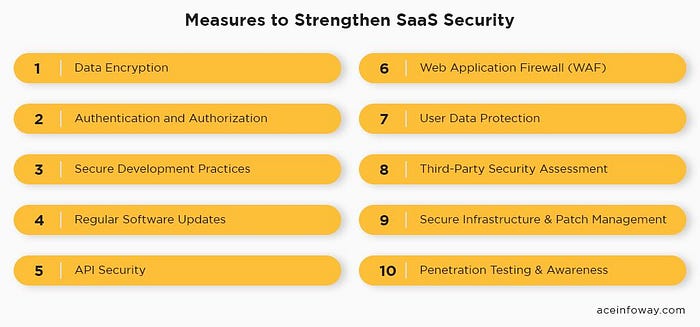Data Armor: Defending Your SaaS Applications in a Digital World

Software as a Service (SaaS) has revolutionized business operations with its cost-effective and scalable solutions. However, the growing SaaS industry faces a significant challenge: SaaS security. In 2022, the United States reported 1802 cases of data compromise, affecting 422 million individuals. This emphasizes the critical need for robust SaaS security measures.
Why is SaaS Security Important?
In today’s digital landscape, businesses heavily rely on SaaS applications for daily operations. Security breaches can lead to dire consequences like data leaks, financial losses, legal issues, and reputational damage. Safeguarding sensitive data isn’t just about protecting information; it’s about ensuring an organization’s integrity and secure functionality.
Challenges and Risks Associated with SaaS Security:
1. Lack of Control
Organizations struggle with limited control over SaaS infrastructure, making policy enforcement challenging.
2. Identity Management
Managing user identities across various SaaS applications is complex, leading to unauthorized access risks.
3. APIs Insecurity
Insecure APIs can be exploited, posing risks if not properly secured.
4. Third-Party Integration
Integrating diverse services can create security gaps due to varying standards.
5. Misconfiguration
Incorrect settings in SaaS applications lead to vulnerabilities, making secure service provision difficult.
Mitigating Challenges and Risks:
Organizations can mitigate these challenges by implementing strong identity management, regular assessments, encryption, a comprehensive incident response plan, employee education, collaboration with trusted SaaS providers, third-party security assessments, and compliance adherence.
Best Measures to Strengthen SaaS Security:

1. Data Encryption
Encrypt data in transit (using protocols like HTTPS) and at rest (in databases or on disk) to prevent unauthorized access.
2. Authentication and Authorization
Implement multi-factor authentication (MFA) and role-based access control (RBAC) to verify user identities and restrict unnecessary access.
3. Secure Development Practices
Train developers in secure coding practices, conduct regular code reviews and use secure coding frameworks to minimize vulnerabilities.
4. Regular Software Updates
Keep all components up to date to patch known vulnerabilities.
5. API Security
Secure APIs with proper authentication, authorization mechanisms, rate limiting, and throttling.
6. Web Application Firewall (WAF)
Deploy a WAF to filter and monitor HTTP requests, protecting against common web-based attacks.
7. User Data Protection
Use data masking and anonymization techniques, define clear data retention policies, and regularly back up critical data.
8. Third-Party Security Assessment
Assess the security practices of third-party vendors, ensuring compliance with relevant data protection laws and robust security policies.
9. Secure Infrastructure & Patch Management
Use a secure cloud infrastructure, configure security groups, firewalls, and access controls properly, and promptly apply security patches.
10. Penetration Testing & Awareness
Conduct regular penetration testing, and vulnerability assessments, and provide guidelines for customers to enhance their security.
SaaS security is an ongoing process demanding vigilance, proactive measures, and continuous improvement. By adhering to these best practices, organizations can fortify their SaaS security, ensuring data protection, user trust, and business continuity.
SaaS Security: No Compromises & Ways to Boost It
Final Words
As the SaaS market continues to grow, a proactive and adaptable approach to SaaS security is crucial. It is essential to safeguard sensitive data, ensuring the integrity of these cloud-based solutions. Businesses must prioritize robust SaaS security measures to avoid data breaches and cyber-attacks. By conducting regular security assessments, investing in strong authentication and access controls, and adhering to data protection regulations, organizations can mitigate risks and have secure SaaS.
As an experienced and reliable SaaS development company, we follow stringent SaaS development processes and compliance to create a SaaS product for your business. If the security and performance of SaaS products are your concern and you are looking for a reliable as well as experienced SaaS developer contact us for assistance and consultancy.
